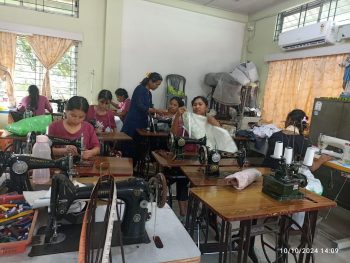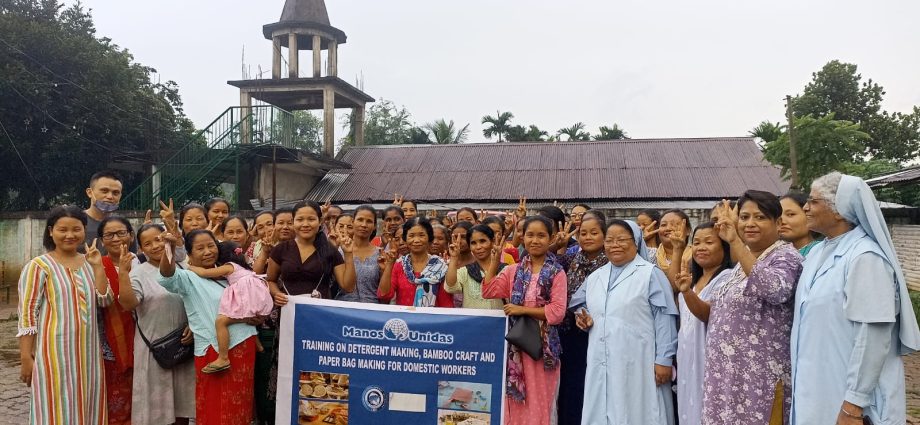By George Kommattam
Guwahati, Oct 14, 2024: Lalhriatpuii says that the time she spent in Centre for Development Initiative has transformed her life.
“All that I learned from here has given me hope,” says the young girl from Tualbungin Mizoram, a state in northeastern India.
Lalhriatpuii (people in Mizoram goes by one name) is among hundreds of village girls from the region who have found a path to hope and opportunity through the center started more than 80 years ago by the Missionary Sisters of Mary Help of Christians, a congregation that originated in northeastern India.
The center, or CDI, is located near the Guwahati Airport.
In the past eight decades, the nuns have been on a mission to uplift the most vulnerable communities in the region, focusing particularly on empowering poor girls from remote and marginalized villages. Through education, vocational training, healthcare and advocacy, the nuns not only help girls like Lalhriatpuii, but transform the future of the entire community.
Sister Teresa Salemthangi, the center’s assistant director, says girls face a grim reality in many rural parts of northeastern India.
“Poverty, lack of education and limited opportunities often force families to send their daughters into domestic work or unsafe migration at a young age. This puts them at significant risk of exploitation and human trafficking,” the nun told Matters India.
She said parents stop their daughter’s education at a young age and send them for domestic work to big cities where they are often exploited. The congregation, through the center, aims to break this cycle.
“We have decided to save them by imparting education and developing skills. We try to give them a life; otherwise, their life will end in misery,” the nun added.
The center offers programs that provide education and vocational skills, giving girls the opportunity to take control of their lives. Its programs are designed to provide practical, life-changing skills that enable the girls to earn a livelihood and regain their dignity, Sister Salemthangi explained.
One of the center’s most impactful initiatives is its vocational training program that imparts skills in tailoring, housekeeping, and soap-making. These skills not only provide a means of financial independence but also help protect them from exploitation.
Sumarlangki from Jaintia Hills, Meghalaya, recalls how the tailoring program changed her life.
“Thanks to the training, I now run my own business. It has given me hope and confidence to earn and live well.”
For girls like Sumarlangki, learning a trade through the nuns’ center is more than just gaining a skill. “It is a lifeline, a way out of the cycle of poverty and exploitation,” the Meghalaya girl told Matters India.
The nuns charge no fees for the training. They provide them free food and shelter that ensures “even the poorest families can benefit,” Salemthangi said.
Alongside vocational skills, the girls are also taught essential life skills such as financial management, self-confidence, and leadership, which further empowers them to take charge of their lives.
The center also provides coaching and education through the National Institute of Open Schooling (NIOS). This program gives young school dropouts a second chance to complete their education.
Sengmitchi N Sangma from Williamnagar in Meghalaya’s Garo Hills says many girls like her continuing their education means the possibility of pursuing careers that were once unimaginable.
“Due to family problems, I couldn’t continue my studies, but CDI gave me hope and opportunities to build a better future,” she told Matters India in early October. Through education, these girls not only change their own futures but create a ripple effect of empowerment within their communities, she added.
In regions where extreme poverty forces many to migrate in search of work, the center plays a crucial role in raising awareness about the dangers of human trafficking. The nuns educate families and young girls about the risks of unsafe migration and provide them with resources and skills to find safe employment.

Those returning to their villages, the center offers reintegration support, helping them rebuild their lives with dignity and independence.
Beyond direct aid to individuals, the center builds leadership and advocacy skills within the communities it serves. Programs such as Youth Leadership Initiatives, Village Vigilance Committees, and Mahila Samiti (women’s groups) encourage girls and women to take active roles in addressing their community’s challenges.
These initiatives foster a sense of empowerment, giving girls and women the confidence to stand up for their rights and advocate for their own futures, the villagers say.
The congregation’s work through the center is to give village girls the tools they need to escape poverty, protect themselves from exploitation, and become leaders in their communities, Sister Salemthangi said.
“Our mission is to empower the poor and marginalized, especially women and children, through capacity building and life skills. We are giving them a life.”
Through partnerships with government agencies and other organizations, the nuns ensure that their programs have a long-term impact.
Founded in 1942 by Venerable Stephen Ferrando, a Salesian missionary, the congregation has chosen its charism as serving the poor and marginalized in northeastern India. Initially focused on alleviating the hardships caused by widespread poverty, illiteracy, and poor health in the post-World War II era, the congregation’s work has grown into a force for transformative change.
Today, its members continue their service from education and vocational training to fighting human trafficking, environmental care.
“The Missionary Sisters of Mary Help of Christians are doing wonderful work, especially for young girls who might have faced difficult lives. Their commitment is truly inspiring,” says Salesian Father V T Dominic, a missionary in the region for the past 25 years.
Sister Salemthangi says their congregation has given village girls in the region something they had once lost – the hope for a better life.
“We believe that every person deserves to live with dignity. Our mission is to uplift those who have been pushed to the margins,” she added.












Great indeed dear sisters